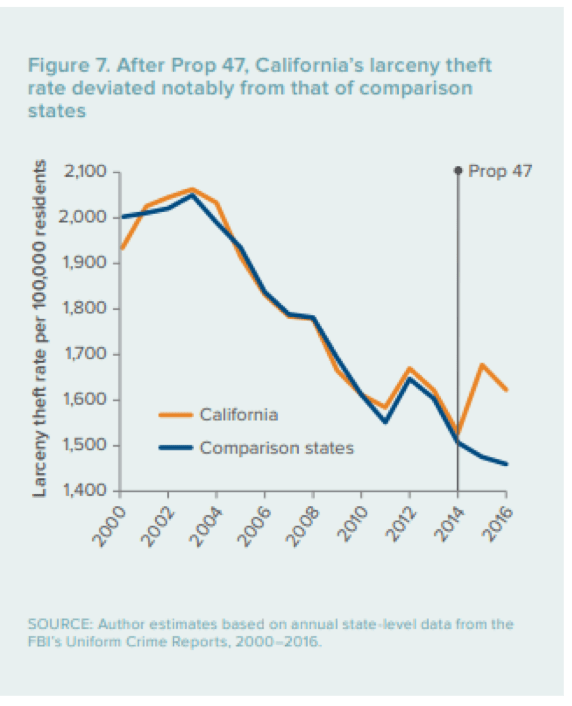California Coddles Criminals
Robert Hampton, American Renaissance, November 30, 2019
In 2014, California’s Proposition 47 reduced thefts under $950, drug possession, and other crimes to misdemeanors. Police are so busy with serious crime they often don’t bother writing criminals up for misdemeanors. Criminals quickly learned this and started brazenly shoplifting. Shoplifting and car theft rose across the state.
“They ain’t out here arresting people for (shoplifting) and everyone knows it,” explained a 21-year-old thief. Retailers and police have certainly noticed: “It’s a boldness like we’re seeing never before and just a disregard for fellow human beings,” Vacaville Police Lieutenant Mark Donaldson told CBS13 in September.
In 2014, California’s voters passed this law by almost 20 points. It wasn’t imposed by judges or half-wit politicians. This is the face of law and order in an increasingly non-white state. Supporters said the initiative would reduce mass incarceration and combat systemic racism. It would also help immigrants, because felonies are deportable offenses while misdemeanors usually are not. Boosters included Catholic bishops, a large network of activist groups, The New York Times, The Los Angeles Times, Jay-Z, and Newt Gingrich. It was called, with no apparent sense of irony, the Safe Neighborhoods and Schools Act.
A 2018 study from the Public Policy Institute of California estimated that in its first year, Prop 47 led to a 9 percent rise in larceny, or an extra 135 thefts per 100,000 residents. The same study noted that violent crime rose 13 percent, but found “no evidence” connecting it to the new law. There is a probable link, however. Thieves are more likely than law-abiding people to be violent. When they stay on the streets due to decriminalization, violence is bound to rise.
This was the first rise in crime after steady declines had reduced offenses to the lowest rates since the 1960s. Astonishingly, the ACLU argued that Prop 47 had nothing to do with it (see graph below).

Marc Debbaudt of the Association of Los Angeles Deputy District Attorneys wrote that the year after Prop 47 passed, San Francisco had the highest increase in property crimes of any American city. Four other California cities were in the top 10. Property crime increased in 49 California cities, with 24 experiencing a double-digit rise. Violent crime also increased that year; San Francisco saw the eighth highest nationwide increase. Overall, violent crime rose in 48 California cities – at double-digit rates in 34 of them.
San Francisco now leads the country in property crime. “San Franciscans find themselves surrounded by squalor and disorder,” reported City Journal in May 2019.
The state’s prison population did fall by 13,000 the year after Prop 47 — but not enough to yield the major cost savings promoters of the initiative had promised.
University of California Berkeley public policy professor Steven Raphael believes Prop 47 had the intended racial effect: “I’m almost certain that the declines in incarceration rates for racial and ethnic minorities have been larger than they have been for whites, simply because they’re so heavily overrepresented in California’s institutional populations.”
Laws like Prop 47 may spread. Progressive prosecutors backed by George Soros have won several elections on a similar platform of leniency. Cook County (Illinois) State’s Attorney Kim Foxx won in 2016. Her first act was to downgrade all thefts under $1,000 to misdemeanors. The president of the Illinois Merchant Retail Association said it meant “open season” on stores. Retail theft in Chicago increased, but it had increased during the two years before that.
In 2018, Philadelphia District Attorney Larry Krasner made thefts under $500 a summary offense, the lowest possible criminal charge. Retail, car, and bike theft increased. Suffolk County (Massachusetts) District Attorney Rachael Rollins vowed earlier this year not to prosecute several crimes, including trespassing, shoplifting, larceny, and disorderly conduct. The move outraged the Retailers Association of Massachusetts, who said it meant “open season on [Boston] retail stores.”
Dallas County District Attorney John Creuzot announced this year his office would no longer prosecute anyone stealing $750 or less of “necessary personal items.” Does that include $200 pairs of sneakers? Texas Gov. Greg Abbott and Texas Attorney General Ken Paxton said this was “abandon[ing] the rule of law.”
Queens (New York) District Attorney candidate Tiffany Caban promised the most extreme policy. She vowed not to prosecute “sex work, recreational drug use, and racist laws.” Some of her “racist laws” were fare evasion, loitering, disorderly conduct, trespassing, and welfare fraud. Miss Caban lost her election by a tiny margin after initially being declared the winner.
Criminal justice “reform” has bipartisan support, and appeals to people who don’t remember the crime rates of the 1980s and early 1990s. Many believe “racial justice” means leniency. If that means “open season” on retailers, that’s just another cost of doing business in multiracial America.















